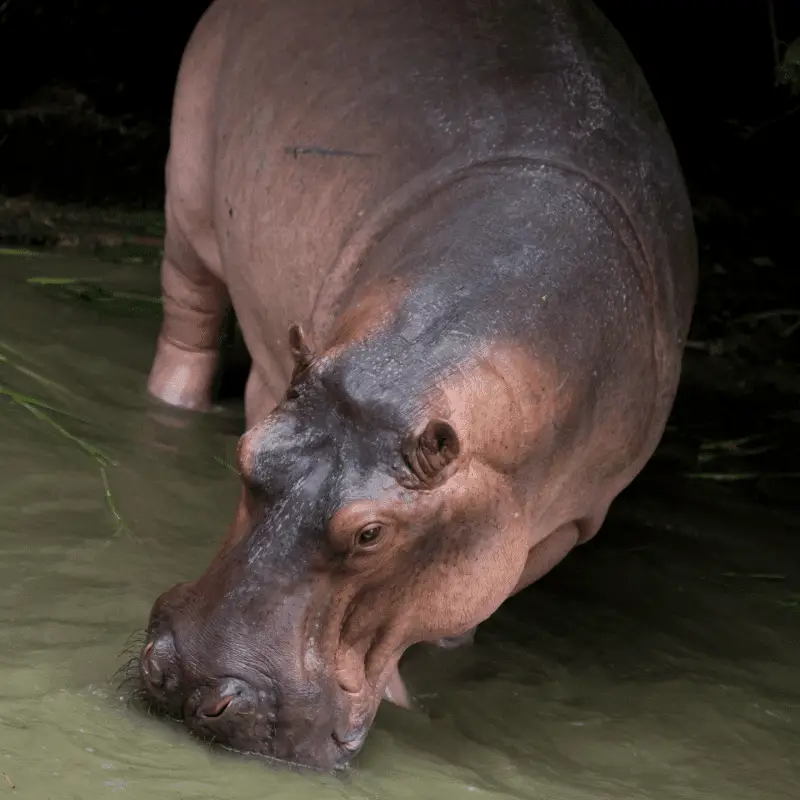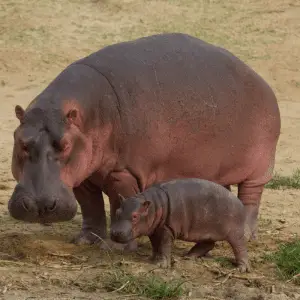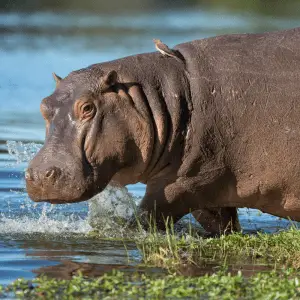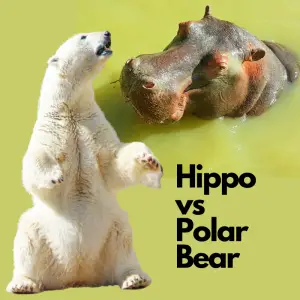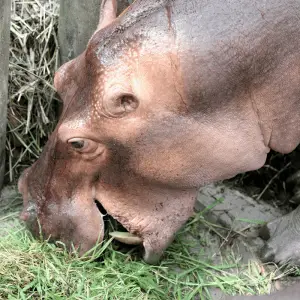Hippos do not generally come out of the water during the daytime, as the harsh sun rays can quickly dry out their sensitive skin. The hippos mostly come out of the water only after sunset for nighttime grazing.
Even though hippos have a natural sunscreen that seeps from their skin and protects them from the harsh sun rays, it is not enough to help them regulate their body temperature. The daytime temperature tends to be higher than the night temperature, so the hippos prefer to feed only at night.
Reasons Why Hippos Live In The Water More Than On Land
It does not matter what time of the year it is; you will always find hippos living in the water of lakes or rivers. As they are adapted to the semi-aquatic lifestyle, these vast animals do not have to face the intense competition for food and other resources, like most animals in Africa. Hippos use this unexploited ecological leash in their favour.
Hippos spend most of their sunlight hours submerged in water. These animals only leave the water after sunset.
There are several reasons why hippos stay in the water most of the time, and the list below helps the hippo improve its survival rate in a harsh environment.
1. Regulate their body temperature
Apart from being an unexploited niche, the water also helps these animals to regulate their body temperature. Hippos do not have sweat glands on their body like other mammals. That is why the cool touch of water helps them regulate their body temperature and keep it under control.
2. Sensitive Skin
Another reason why the hippos choose to stay in the water is that they have susceptible skin. Even though the hippopotamus’s skin is very thick, it is also vulnerable to harsh sun rays. If the hippopotamus stays out of the water during the daytime for an extended period, it will lose a lot of water through its skin and become dehydrated.
Prolonged exposure to the sun’s rays can also make their skin crack. Hippos secrete mucus which is known as blood sweat. This reddish discharge creates a barrier over the sensitive skin of the hippopotamuses. The components of this discharge help these gigantic animals to reflect the UV rays while protecting their skin from getting sunburnt at the same time.
Blood Sweat
This blood sweat can protect the hippopotamus’s skin only for a certain period. The hippos need to return to the water to rehydrate their skin and cool themselves off as soon as possible.
3. Hippo’s Main Home
Another benefit of spending most of the time underwater is that the Hippopotamuses do not need to travel long distances to fulfil their hydration needs. The water that they need to survive is already their home. Another benefit the hippos get from living in and around the water bodies is that they do not have to travel long distances to fulfil their nutritional requirements. These animals live in low-lying areas with a good water supply, and they almost always get to feed on lush vegetation, unlike other herbivores of Africa.
These animals do not need to travel as many miles as other mammals on the land, so they tend to conserve energy. This method of living is highly convenient for hippos.
Hippos generally eat about 40 pounds of grass and other vegetation every day. The amount of vegetation required is significantly smaller than that of the rhinoceros or other larger animals that consume about 100 kg of grass and other vegetation daily.
That does not mean hippopotamuses cannot walk long distances for food. Hippos can walk up to 15 km from their water sources to find adequate food. However, these gigantic animals only take this step if not enough food is available within the short range.
4. Protection
Another benefit that is staying underwater offers these large animals is protection. As the baby and the mother live most of the time underwater, they are mainly secured from the attacks of land-based predators. Unlike most land mammals, the hippos do not have to protect their babies as vigorously.
This security allows the baby hippos the time to grow outside of their mother’s womb. That is why the gestation period of the hippopotamus is significantly smaller than other largest land mammals.
The gestation period of the hippopotamus is about eight months, almost half the rhinos’ gestation period and nearly 14 months less than an elephant’s gestation period.
All in all, living in the water helps the hippos conserve energy and live significantly safer lives.
The Differences Between Hippos and Water Mammals
There is a compelling link between hippopotamuses and the water mammals like dolphins and whales.
The whales and hippopotamuses share a standard line of ancestry that broke away from the herbivorous mammals millions of years earlier.
This discovery helps us to understand why the hippos lead such a semi-aquatic life even after being land mammals.
Hippos have developed unique adaptations that make them live comfortably in their watery home.
1. Hairless Adaption
First of all, hippos do not have any hair on their skin. Even though it may deviate from the characteristic features of mammals, this absence of hair helps these gigantic animals to move quickly underwater.
2. Skin Thickness Adaption
The thickness of their skin also helps these massive animals to have proper insulation against cold water.
How thick is the hippo’s skin?
The skin is two inches thick on the flanks and slightly thinner elsewhere.
3. Breathing Adaption
The fact that hippopotamuses can hold their breath underwater for as long as 5 minutes has helped these gigantic animals sleep while fully submerged. The hippos come up to the surface to breathe without waking up.
How long can a hippo hold its breath?
Hippos can hold their breath for five minutes at any one time. After this time, they will need to surface for air.
4. Head Shape Adaption
The shape of the head of the hippopotamuses also indicates how well adapted these animals are for living underwater compared to other mammals. Their eyes and ears are on top of the head rather than on the side. The position of the eyes and ears helps the hippos to breathe and hear whilst partly submerged.
5. Birth Adaption
Additionally, hippos can mate, give birth, and even feed their young while staying submerged underwater compared to mammals.
How long are hippos pregnant?
Hippos are pregnant for eight months, and a hippo will give birth underwater.
Main Difference Between Hippos, Whales And Dolphins
The most significant difference between hippopotamuses and whales and dolphins is that hippos can’t swim. On the other hand, the hippos prefer to walk along the bottom of the water floor instead of swimming, and they do this very well.

